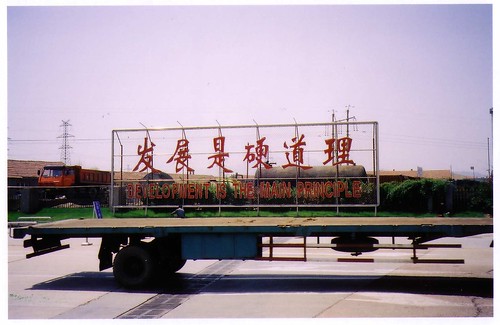My Fortune China blog: “Sustainable Development is the Main Principle” — ie, Blogging the “hard truth”
 When I moved to Qingdao in 2002 after finishing undergrad, I lived in one of China’s earliest and largest national-level economic and technological development zones. Pervading The Zone were massive billboards displaying 10-meter high bust shots of the octogenarian Deng Xiaoping. Deng Xiaoping is widely recognized as laying the thoughts that have steered China to economic success over the last 30 years of “reform and opening up”. His steady, posthumous gaze seemed to be guiding the construction of infrastructure in The Zone. His vision shone upon the future bridge connecting The Zone to old Qingdao, and upon the various refineries and factories. His plan penetrated the department stores full of mannequins, sales staff and no customers. This was an eerie, eye-opening time, and The Zone had major impacts in how I have subsequently come to view the world.
When I moved to Qingdao in 2002 after finishing undergrad, I lived in one of China’s earliest and largest national-level economic and technological development zones. Pervading The Zone were massive billboards displaying 10-meter high bust shots of the octogenarian Deng Xiaoping. Deng Xiaoping is widely recognized as laying the thoughts that have steered China to economic success over the last 30 years of “reform and opening up”. His steady, posthumous gaze seemed to be guiding the construction of infrastructure in The Zone. His vision shone upon the future bridge connecting The Zone to old Qingdao, and upon the various refineries and factories. His plan penetrated the department stores full of mannequins, sales staff and no customers. This was an eerie, eye-opening time, and The Zone had major impacts in how I have subsequently come to view the world.
My strongest impression of Life in The Zone was one of Deng’s key quotes emblazoned everywhere on those giant billboards or in neon signs at the major entrances to the zone: ![]() . (Chinese isn’t working for me in WordPress….most of the signs had “fazhan cai shi ying daoli” instead of the pictured “fazhan shi ying daoli“)
. (Chinese isn’t working for me in WordPress….most of the signs had “fazhan cai shi ying daoli” instead of the pictured “fazhan shi ying daoli“)
The English translation: “Development is the main principle.” Since I could could not read or speak a lick of Chinese when I crash landed there in Shandong Province, only after many more years of studying Chinese would I realize the more literal and telling translation of most of these signs (but not the sign pictured, if you want to get technical): “Development is the only hard truth.”

This hard truth had a profound affect on my psyche and my priorities. One of the most mind-boggling aspects to my young American mind undergoing its first China experiences then was just how much I had taken for granted that different levels of development have profound effects on peoples’ lives. Life in The Development Zone left the indelible impression that my rather self-involved American priorities were in need of a tune-up. Soon I was no longer the cynical postmodernist my education and culture had taught me was fine to strive for. I decided to devote hours and hours every day to studying Chinese and learning the mechanisms to explain China’s economic miracle.
I also fretted that all this economic growth would lead to unprecedented environmental destruction and decided to learn enough about the situation to (hopefully) make a difference.
I figure that a new paradigm combining the pragmatism and razor insight of Premier Deng with the advances in science, business strategy, and human ingenuity that development brings is one of the best strategies for steering our planet toward ecological, social, and economic sustainability.
When Fortune China‘s editor-in-chief asked me to blog for his magazine after he saw me speak at a American Chamber of Commerce in Hong Kong event organized by my friend Ed Ahnert on “corporate responsibility policy in China: opportunities for competitive advantage,” I decided to take him up on the offer.
Blogging for Fortune China, Celebrating 30 years of “Reform and Opening Up”
Corresponding with the thirtieth anniversary of Deng’s “reform and opening up” policy celebrated this month, I decided to call my bilingual Fortune China blog “Sustainable Development is the Main Principle” .
To my mind, Deng’s greatest insight was the importance of taking practical measures to deepen the world’s level of economic and social interdependence. Corporations, inter-government organizations, and international nonprofit organizations are the main globalizers of our age. “Sustainable Development is the Main Principle” focuses on how these organizations are contributing to sustainable development, with a special focus on how multinational corporations can gain and maintain competitiveness in this fast-changing environment.
Sustainable Development is the Main Principle–first blog posts
- Stakeholder engagement in Chinese history and what it means for business today: the story of Yang Jisheng and the earliest example of “stakeholder engagement” I’ve been able to find in Chinese history;
- The power and point of TED: branding, strategy and good ideas: all about how TED presentations can help with work, presentation skills, and changing the world. This post especially profiles the presentation by the World Wildlife Fund’s Jason Clay on his work with global corporations and improving the sourcing of global commodities to reduce negative environmental impacts.
More soon to come! I hope you enjoy reading “Sustainable Development is the Main Principle“!


0 Responses to “My Fortune China blog: “Sustainable Development is the Main Principle” — ie, Blogging the “hard truth””